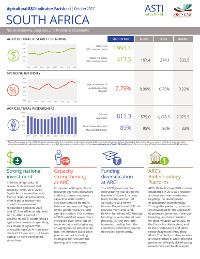Authors:
Nienke Beintema, Lang Gao, and Petronella Chaminuka
Year:
2017
Publisher
International Food Policy Research Institute
Back to:
In terms of agricultural research investment and capacity levels, as of 2014 South Africa ranked second from a regional perspective, after Nigeria. Investment in agricultural research rebounded between 2008 and 2013 in inflation adjusted terms, after a period of decline. In 2014, South Africa’s agricultural research spending as a share of AgGDP was unusually high by African standards (2.78 percent), but levels appear to have contracted since then.
Compared with agricultural research agencies elsewhere in Africa, human resource capacities within ARC’s institutes tend to be more balanced in terms of degree levels, gender balance, and age distribution. The number of PhD-qualified researchers increased over time, but an issue remains with replacing an aging pool of senior scientists. An effective succession plan is needed, including strategies for recruitment, training, and mentoring.
The 2009 governmental restructuring that led to the transfer of some functions from the Department of Agriculture to a newly formed Department of Rural Development and Land Reform benefited ARC through funding for a number of new projects. During this time, however, funding from the country’s commodity boards decreased significantly.
ARC’s Biotechnology Platform was established in 2010 as a research and service-driven mechanism targeting the development of agricultural biotechnology. Through the platform, resources are developed for the application of advanced genomics, molecular breeding, and bioinformatics for dissemination within ARC, to the Council’s collaborators, and to the private sector and other research agencies throughout Africa. The platform also provides an environment in which the next generation of highly skilled young researchers can be developed.

